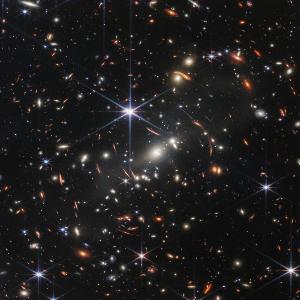The mystery of dark energy and the nature of accelerating expansion
3 Jul 2023
A look at the research group of Prof. Jochen Weller, one of the founders of the Euclid mission
3 Jul 2023
A look at the research group of Prof. Jochen Weller, one of the founders of the Euclid mission

Deep field image from NASA's Webb telescope | © Webb / NASA
Clusters of galaxies are the largest and most massive objects in our universe. Their distribution and evolution are closely tied to the expansion history of the Universe and how matter clumps together. As such, galaxy clusters can be used to test the expansion of the Universe and ultimately Einstein’s theory of gravity itself. With the Euclid mission, it will become possible to discover and measure thousands of galaxy clusters. Professor Jochen Weller, one of the founders of the Euclid mission, Dr. Barbara Satoris, and further members of the Physical Cosmology research group are playing a leading role in preparing the Euclid mission for scientific analyses using galaxy clusters. Dr. Nico Hamaus and his working group are concentrating on the study of so-called cosmic voids with the Euclid mission.
Testing theories of the evolution of the Universe will be a primary focus. “Euclid will enable us to understand the nature of accelerated expansion. Ultimately, we will test Einstein’s theory of gravity at very large distances and – who knows? – we may even disprove him,” says Professor Weller. He adds: “As Dean of Studies, I would also like to emphasize that it’s not only LMU employees that have the opportunity to work on this exciting frontier. As part of research-oriented teaching, our students doing bachelor’s and master’s dissertations will also be involved in evaluating data from the mission.”